

Ending Extreme Poverty in a Generation. October 30, 2013 poverty, birth mortality, children, environment 1.3 billion people in our world currently live in extreme poverty.
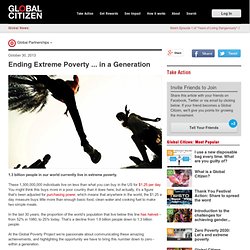
These 1,300,000,000 individuals live on less than what you can buy in the US for $1.25 per day. You might think this buys more in a poor country than it does here, but actually, it’s a figure that’s been adjusted for purchasing power, which means that anywhere in the world, the $1.25 a day measure buys little more than enough basic food, clean water and cooking fuel to make two simple meals. In the last 30 years, the proportion of the world’s population that live below this line has halved – from 52% in 1980, to 25% today. At the Global Poverty Project we’re passionate about communicating these amazing achievements, and highlighting the opportunity we have to bring this number down to zero - within a generation. How we think about extreme poverty We know ending extreme poverty is a big and complex challenge. Does foreign aid really work? An updated answer.
This blog post is based on Roger Riddell’s keynote address to the 2014 Australasian Aid and International Development Policy Workshop.

I have worked on aid and development issues for some 40 years, and have tried to engage as a “critical friend” of aid, perhaps–inevitably–drawing fire from both aid’s supporters and critics. In 2008, I wrote a book titled Does Foreign Aid Really Work? In my address [pdf], and the new paper [pdf] on which it is based, I revisit the evidence and the question itself. Is aid working? Is this the right question to be asking? “Is it working?” Is the question most commonly asked of aid. In response, aid agencies feed the public a diet of overwhelmingly “good news stories” to convince them that it is working.
This diverts attention from the central question: how to reduce the major gap between what aid currently does and what it could achieve. How donors provide aid is a major cause of aid’s current ineffectiveness. International aid today and its origins International aid forms a constituent part of contemporary international relations.
Can aid work? Primary school close to our house in Addis Ababa Living in Ethiopia for the last three years, I saw aid working every day.

I saw children going to school, health workers in rural villages, and food or cash preventing hunger for the poorest people. Money may be tight, but 'smart aid' to developing countries can really work. A lot of water has passed under the bridge since Britain hosted the G8 summit at Gleneagles in July 2005.
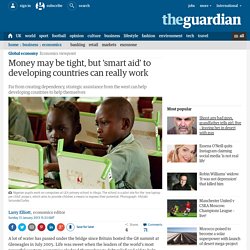
Life was sweet when the leaders of the world's most powerful western economies pledged themselves to debt relief and aid to help poor countries. Growth was strong, asset prices were rising, and the financial crisis was two years away. In 2013 it will, once again, be Britain's turn to chair the G8, but the mood will be quite different when leaders meet at Lough Erne in Northern Ireland this summer. The talk will be of fiscal cliffs, the euro's struggle for survival, high energy prices and the struggle to ensure financial solvency.
The World's Best News. Progress on the MDGs. Aid Works – Some Examples. Foreign aid works – it saves lives. The critics of foreign aid are wrong.
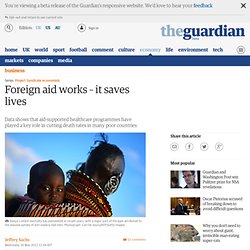
A growing flood of data shows that death rates in many poor countries are falling sharply, and that aid-supported programmes for healthcare delivery have played a key role. Aid works; it saves lives. One of the newest studies, by Gabriel Demombynes and Sofia Trommlerova, shows that Kenya's infant mortality (deaths under the age of one year) has plummeted in recent years, and attributes a significant part of the gain to the massive uptake of anti-malaria bed nets. These findings are consistent with an important study of malaria death rates by Chris Murray and others, which similarly found a significant and rapid decline in malaria-caused deaths after 2004 in sub-Saharan Africa resulting from aid-supported malaria-control measures.
Let's turn back the clock a dozen years. These interconnected crises prompted action. Likewise, the World Health Organisation issued a major call to scale up development assistance for health. Bill Gates: The Real Successes of Foreign Aid. Aid programs really do help improve life for people in poor countries. That's the myth-busting conclusion of a new book that I hope will be widely read and discussed.
Here I review "Getting Better: Why Global Development is Succeeding -- and How We Can Improve the World Even More. " Bill Gates on the Real Successes of Foreign Aid. Mark Suzman: Development Aid Is Working. Proof that aid works? Child mortality plummets - Africa - World. Research released yesterday showed fewer than seven million children under the age of five died last year compared with nearly 12 million in 1990.

While child mortality is declining across the world, huge challenges remain in sub-Saharan Africa and south Asia, which together accounted for more than 80 per cent of all under-five deaths in 2011. On average, one in every nine children in sub-Saharan Africa dies before the age of five. "The global decline in under-five mortality is a significant success that is a testament to the work and dedication of governments, donors, agencies and families," said Anthony Lake from the UN children's agency Unicef. "But millions of children under five are still dying each year from largely preventable causes for which there are proven, affordable interventions.
" Hans Rosling: The good news of the decade?
Poorer without aid. The academic debate about aid effectiveness is a long and still unsettled one.
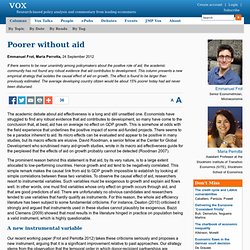
Economists have struggled to find any robust evidence that aid contributes to development, so many have come to the conclusion that, at best, aid has on average no effect on GDP growth. This is somehow at odds with the field experience that underlines the positive impact of some aid-funded projects. There seems to be a paradox inherent to aid. Its micro effects can be evaluated and appear to be positive in many studies, but its macro effects are elusive.
No Evidence that Aid Stimulates Growth. "... regardless of the situation -- for example, in countries that have adopted sound economic policies or improved government institutions -- or the type of assistance involved, aid does not appear to stimulate growth over the short or long term.
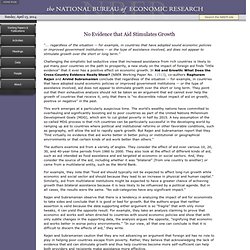
" OECD: aid helps economic growth.